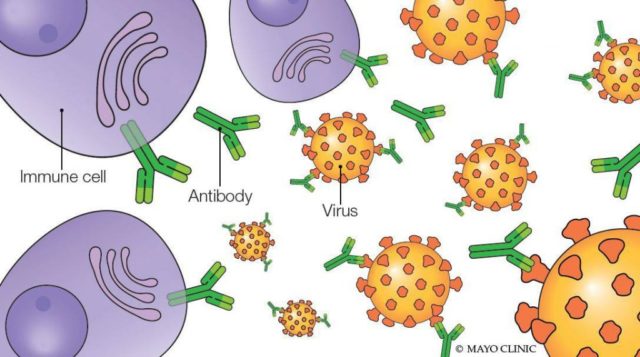
Current experimental treatments for COVID-19 focus on two targets: the virus or the immune system. On the immune system side, the number of experimental treatments is growing. The vast majority are called monoclonal antibodies. This type of drug is not new, and many are currently approved to treat conditions such as cancer or rheumatoid arthritis. But some are being developed from scratch to boost the initial immune response for patients who are at risk of severe COVID-19 disease. These experimental drugs may provide patients with a way to get ahead of the virus and help manage the strain on hospital intensive care services. But what are monoclonal antibodies?
Antibodies versus Monoclonal Antibodies
Antibodies are Y-shaped snippets of protein made by the immune system. They have various functions, but basically, antibodies flag things the immune system needs to investigate. For example: When a virus invades a cell, it enters across through the cell’s membrane, takes over and makes copies. These copies are released from the cell to head out and infect other cells. As the virus travels, some of these bad actors trip an immune system “red alert.” After a series of events, immune system B cells transform into plasma cells and begin to churn out antibodies. Each B cell makes millions of copies of a single antibody.
When needed, each B cell will divide into two daughter B cells that are essentially clones of the parent. These clones produce the same antibody. Antibodies stick to specific parts of the virus, recognizing different targets on the virus particle. This response is called polyclonal ― “poly” because you have many different antibodies and “clonal” because each type of antibody comes from a set of cloned B cells. If an antibody sticks to a part of the virus in a way that prevents it from getting into the cell — like the spike proteins on SARS-CoV-2 — then they are called neutralizing antibodies.
Monoclonal antibodies are drugs. They consist of one (mono-) neutralizing antibody copied (cloned) in a lab and researched for usefulness against a specific disease or condition. Monoclonal antibody drugs can be used to boost the immune system’s response or calm it down. They can be used alone or in combination with other monoclonal antibodies.
Read the rest of the article on Discovery’s Edge.
‘Courtesy: Mayo Clinic News Network.’[/vc_message]
Disclaimer
The information contained in South Florida Reporter is for general information purposes only.
The South Florida Reporter assumes no responsibility for errors or omissions in the contents of the Service.
In no event shall the South Florida Reporter be liable for any special, direct, indirect, consequential, or incidental damages or any damages whatsoever, whether in an action of contract, negligence or other tort, arising out of or in connection with the use of the Service or the contents of the Service.
The Company reserves the right to make additions, deletions, or modifications to the contents of the Service at any time without prior notice.
The Company does not warrant that the Service is free of viruses or other harmful components












